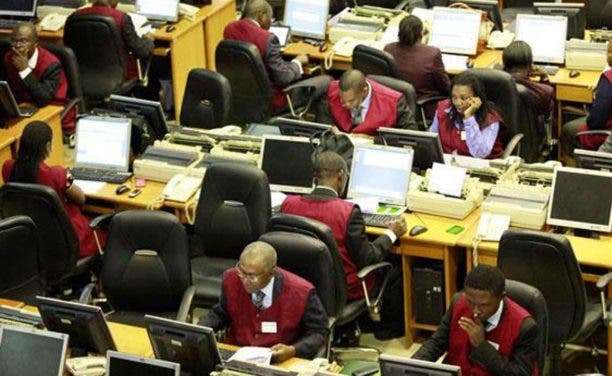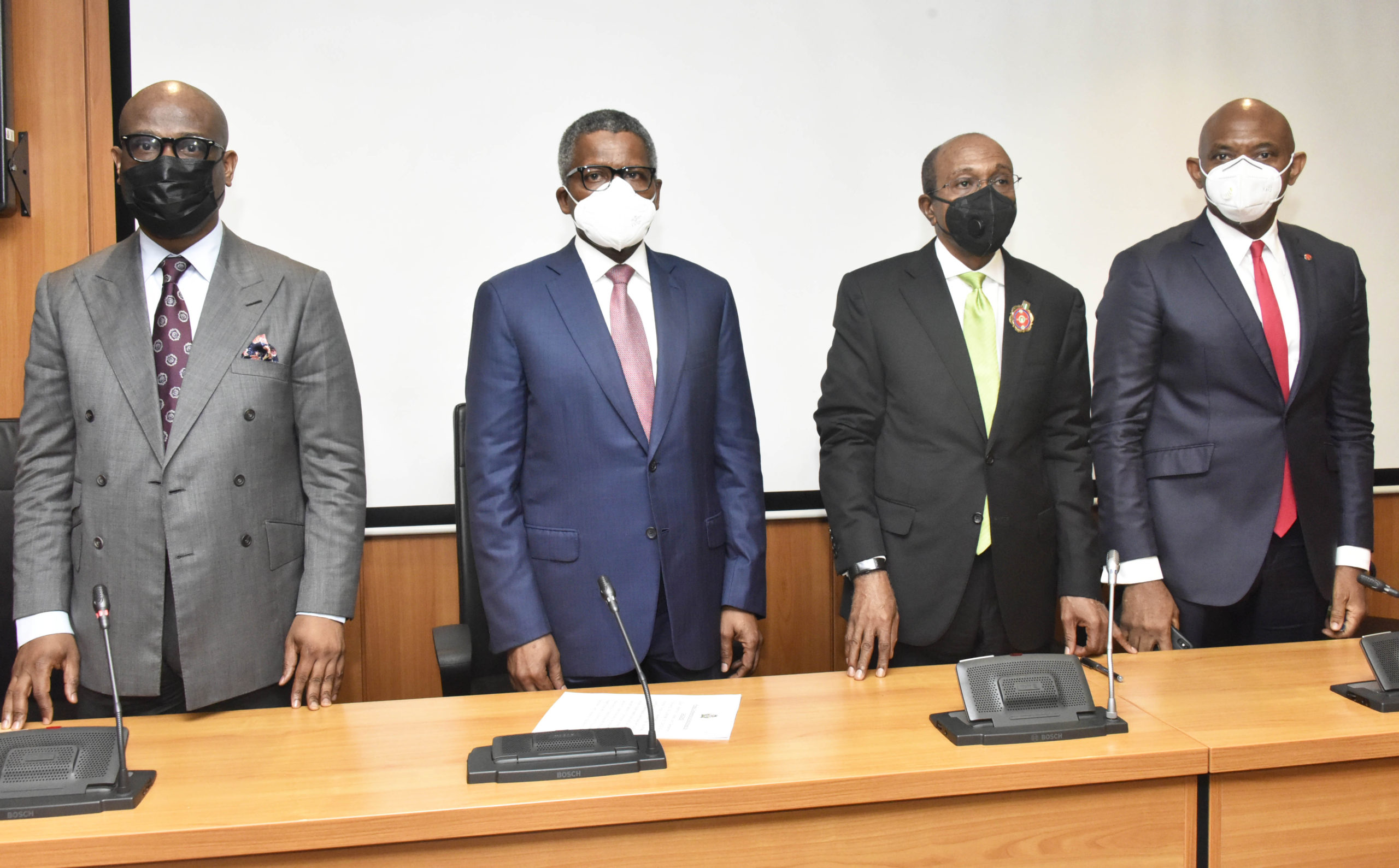
At the backdrop of the recent bullish (trend in the) stock market, just six companies listed on the Nigerian Stock Exchange, NSE, now account for 71 percent of the market size, while a set of 15 accounts for about 90 percent of the market.
The total number of companies on the NSE as at last weekend is 165 with 150 of them confined to the little fragments of the market.
The market capitalisation of the six dominating companies hit N13.722 trillion last weekend while the total market capitalization peaked at N19.236 trillion.
The NSE market capitalisation of the equities refers to the total value of the equities of all the 165 companies listed on the Exchange.
Meanwhile market operators and stakeholders lament what they see as a fragmented stock market with little trading options for investors and dealing members.
Economist and corporate analysts have opined that the government should prioritise partial privatisation of large public enterprises and get them listed on the Exchange to boost liquidity and create a more diffused market capitalization away from the few companies.
Financial Vanguard’s investigation reveals that the 15 companies that account for 90 percent of the market, control the direction and the fate of the stock market as prices fluctuate, a development market operators believe does not reflect the fortune of the entire market and the economy.
Operators and stakeholders are also seeking for a new market structure with large numbers of companies in different sizes of small, medium and large across all the sectors of the economy to be listed on the Exchange.
The fifteen companies are Dangote Cement Plc, MTN Nigeria Communications Plc, Airtel Africa Plc , BUA Cement Plc, Nestle Nigeria Plc, Guaranty Trust Bank Plc, Zenith Bank Plc.
Others include: Nigerian Breweries Plc, Stanbic IBTC Plc, Lafarge Africa Plc, Access Bank Plc, UBA Plc, First Bank Nigeria Holdings Plc, Dangote Sugar Plc and Seplat Petroleum Company Plc.
In the circumstance of this concentrated market structure, the Securities and Exchange Commission (SEC) has said it is exploring various avenues to bring more companies to list on the capital market and to increase the number of products in the market.
The Commission said the initiative would raise the market capitalisation of the NSE and contribute to the development of the nation’s national economy.
The Director-General, SEC, Lamido Yuguda, disclosed this at the sideline of 2020 Annual workshop of the Capital Market Correspondents Association of Nigeria (CAMCAN).
Top 6 largest
An analysis of the market capitalisation showed that Dangote Cement Plc has the highest capitalisation of N3.49 trillion or 19.1 per cent of total equities market capitalisation.
MTN Nigeria Communications Plc occupied the second position with N3.15 trillion, accounting for 17.2 per cent of market capitalisation.
The newly listed Airtel Africa has overtaken Nestle Nigeria Plc to occupy the third position with N2.21 trillion and accounted for 12.0 per cent of total equities market capitalisation.
BUA Cement Plc, the first company to list on the Exchange this year occupied the fourth position posting N1.86 trillion. The Company achieved this feat with the listing of its 33.86 billion ordinary shares at N35 per share.
Nestle Nigeria Plc which hitherto occupied the third position amongst the largest capitalised equities now occupied the fifth position with N1.1 trillion and accounted for 7.6 per cent of the total market capitalisation.
Stakeholders, economists, analysts reactions
Commenting on the stock market structure, Uche Uwaleke, a Financial Economist and a Professor of Capital Market at the Nasarawa State University Keffi said: “The Federal Government needs to partially privatise government assets such as the Nigerian National Petroleum Corporation, NNPC through the NSE in order to create liquidity and enhance market capitalisation.”
Uwaleke who spoke to Financial Vanguard on the sideline of the CAMCAN 2020 workshop, said: “My advice is for the Federal Government to deploy proceeds from the sales of these public enterprises to recapitalise development financial institutions such as the Bank of Industry (BoI) and Bank of Agriculture (BoA).”
Uwaleke also advocated the partial privatisation of the Nigerian Commodity Exchange (NCX) and called on the government to put in place policies to support the commodity trading ecosystem as this will help boost the capital market.
Uwaleke also canvassed for the provision of fiscal incentives for companies listed on the Securities Exchanges to boost their performance and market capitalisation.”
Commenting as well, analyst, Head of Research and Investment, FSL Securities Limited, a Lagos based investment firm, Mr. Victor Chiazor said: “The main reason we have about 15 companies accounting for more than 88 per cent of total market capitalisation is simply as a result of positive investors’ reactions towards the performance of these 15 companies.
“The reality is that most of the other listed companies have failed to impress investors. They are either reporting weak earnings, bad corporate governance, inconsistent dividend/bonus pay out or poor investor relation handling.”
On the implication of few companies dominating the market, he said: “The implication for the market is that these few companies will determine the direction of the market. Meaning it doesn’t matter what direction the other listed companies move, once most of the highly capitalized stocks move in one direction, the market will follow.
“For those that use the market performance to gauge the Nigerian economy, this imbalance may be misleading, especially if the person fails to understand the dynamics of the market.
“Hence, improving the earning performance of other listed companies is critical to increasing investor sentiments towards them, while the need to find strategic ways of attracting other blue chip companies to the market will help in improving the number of stocks responsible for the market swings.”
In his own view, a Chartered Stockbroker and Managing Director/Chief Executive Officer, APT Securities Limited, Mr Garba Kurfi, said: “ In reality, six of the 15 companies constitute 64 per cent of the market capitalisation; Dangote Cement, MTN, Airtel, BUA Cement, Nestle and GTB (,) the nine other companies add 15 per cent only.”
On the implication, he said: “The implications are many. First, it makes our NSE All Share Index, ASI, no longer relevant because it moves up and down with the movement of just a few listed companies . That is why price movements of either Dangote Cement or MTN affect the movement of ASI.
“Our market needs the participation of more companies such as NNPC, Nigeria LNG, Glo among many others to dilute the influence of these few companies dominating the market.
“This also does not allow ASI to be a barometer of the economy. There is a need for the listing of electricity generating companies, GENCOs, and the distribution companies, DISCOSs, among others.”
Another market operator and Chief Operating Officer, InvestData Consulting Limited, Mr. Ambrose Omoriodon said: “In any market of the world there are different categories of stocks that lead to different indexes to measure their performance. These 15 stocks or companies on the NSE influence the general market performance as a result of its capitalization.
“It is expected that these companies should have created more wealth for Nigerians due to their huge earnings but the shareholding structure and float has not helped in this matter.
“To reduce the influence of these 15 companies and balance the market, more new companies should be encouraged to list on the Exchange as the economy is expected is (to) sustain its recovery this year, 2020.
“The present market fragmentation is not the best for our market; we need to have a standardized market where we have companies from across the sectors of the economy listed so that no one firm or few firms will be domineering and dictating the movement of the market as we currently experience.”
Continuing, Omordion said: “It is not too good for these few companies to keep dominating the market because it doesn’t represent the whole economy, and some of these companies are having float problems due to their shareholding structure.
“It shows that the market is not deep and does not represent the size of the economy.
“The listing of MTN Airtel Africa and BUA Cement was a welcome development that reduced Dangote Cement‘s dominance and control. The government and the market regulators should encourage companies to list and participate.
“Making the right policies to drive economic growth and encourage small businesses to list by reducing cost of listing and post listing requirements are key to addressing this issue.”
Vanguard




